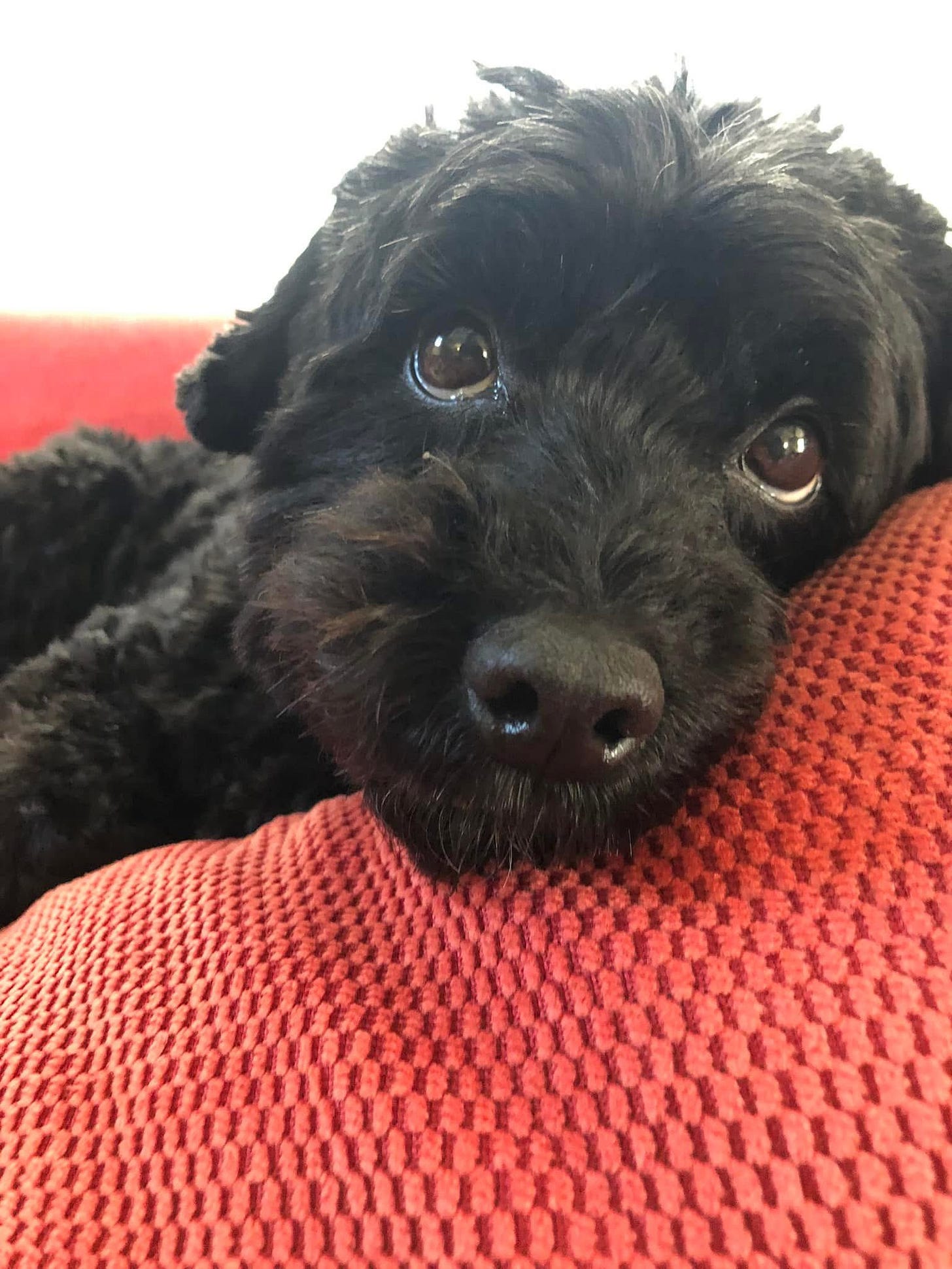When I feel overwhelmed or stressed or have too many things happening that I have to take care of, it can feel like my system is fritzing out if it goes on for too long. In the past, I would pick up my 17 lb dog and just hold him, look out the window, and calm down. Like a nervous system reset. He seemed to sense what I needed.
After almost 14 years of being by my side through all of the loss, pain and injury, heartbreak, joys, and lovely times…it was time to say goodbye to my dear little friend and constant companion. The constraints of old age and dementia were wearing his body out. I am not quite to the perspective part of the fact that it was the right thing to do, I guess somewhere inside of me I do know that, but it is still too raw, only two weeks today. The house feels lifeless and without air and movement.
I have been very busy over the past couple of months, supporting individuals dealing with deep trauma and unexpected loss. In March and April, I hosted two different grief retreats and conducted presentations and all-day workshops. Additionally, I’m excited to share that I was one of the recipients of the Healing Pathways Grant for my online course, "The Practical Guide to Understanding Grief ".
I educate about grief and loss, all day, every day. Even so, I was once again shocked at how physically and emotionally exhausting grief is. How grief begets grief. It is hard to separate any of the loss, it all just shows up.
In hindsight, I should have not worked the week of losing Ziggy. I was not fully there mentally, I was not giving my clients my full attention, and I was not sleeping well. I know better than this. And yet, we constantly override what our wise body and emotions tell us, by listening to our brain. “You can absolutely do this, it is no big deal, you have handled much worse”
In the recent American Brain Foundation webinar “Healing Your Brain After Loss: A Neurologist’s Perspective,” Lisa M. Shulman, MD, explains the effects of traumatic events, such as loss and personal tragedy, on the brain.
“Grief comes in many forms. Whether brought on by the death of a loved one, a serious illness or injury, divorce, abuse, or another cause, the brain interprets grief as emotional trauma or PTSD. Dr. Shulman explains that the human brain handles emotional trauma and stress using the same set of processes.”
“Traumatic loss is perceived as a threat to survival and defaults to protective survival and defense mechanisms,” says Dr. Shulman. This response engages the fight or flight mechanism, which increases blood pressure and heart rate and releases specific hormones. Grief and loss affect the brain and body in many different ways. They can cause changes in memory, behavior, sleep, and body function, affecting the immune system as well as the heart. It can also lead to cognitive effects, such as brain fog. The brain’s goal? Survival.”
Grief is real. It affects how we function. We should honour that and allow our whole system some time to adjust to the loss.
Yesterday, I felt all kinds of out of sorts. Like all my computer tabs in my brain were open at once and all my to-do lists were piling on me. I was fritzing out. But I did not have Ziggy to hold and settle me. I decided to go into the garden and rip last year’s detritus and debris out. Rake and bag and clean up. I felt a bit better.
But I sure do miss my warm loving companion who gave me so much comfort over the years. I am so grateful to him.
What do you do to settle yourself and honour your grief when it shows up?
on we go,
Hilary



I am so sorry for your loss of Ziggy, it is so so hard with pets, they are such a constant presence. It was so rough losing our Alfie a couple of years ago, but at least had the buffer of cats in the house, although their presence is quite different. I think we power through and do our duties despite our better knowing because we also know that to sit in the grief is so painful, and we are willing to defer it a little longer hoping maybe later it won't be so bad. But it still catches up. Gardening, or being in nature is often my solace even if it is grief about the world/politics/man's inhumanity to man rather than some personal relationship and grief. Gardening works better because I can be creating and more focused and physically work off some of the pent up frustration or anxiety. It's tough when stuff happens in the winter season, unless there is shoveling to do. I seem to recall quite a manic shoveling event in the winter now that I think about it. Not sure what I was off about. Sending you hugs and hoping you find the space in your days to feel and be with it and know the love.
Oh Hilary I am so sorry…..please know I am sending you much love and lots of hugs.
For me being in my garden and nature, listening to the birds, peepers, seeing the sun dance on the lake or just the quiet brings comfort for me. Tears also flow pretty freely and does seem to help. Thinking of you my friend.